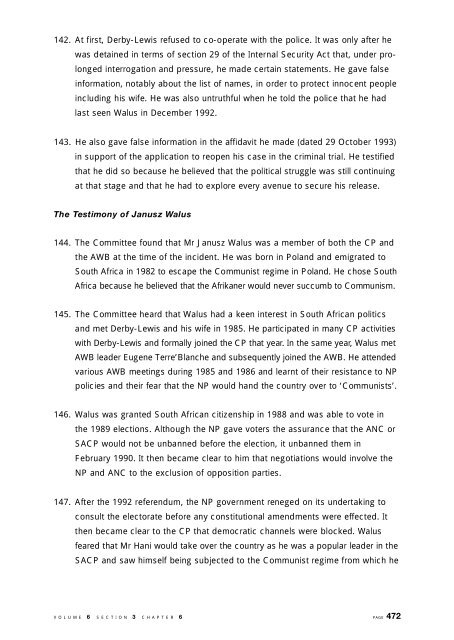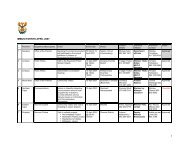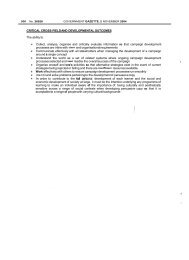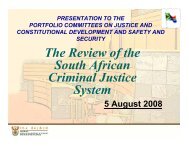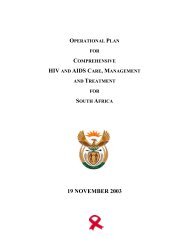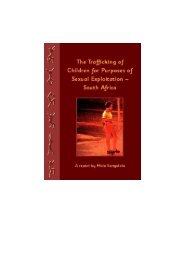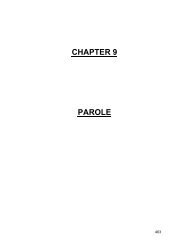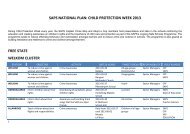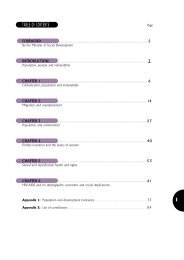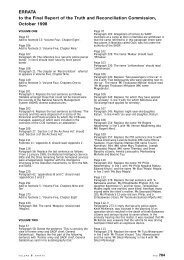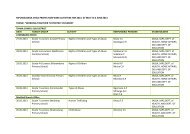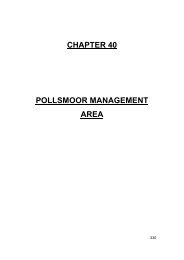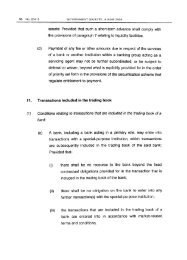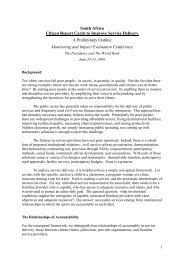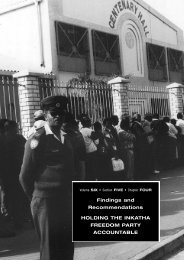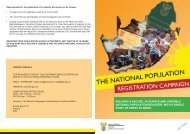Right-Wing Groups - South African Government Information
Right-Wing Groups - South African Government Information
Right-Wing Groups - South African Government Information
You also want an ePaper? Increase the reach of your titles
YUMPU automatically turns print PDFs into web optimized ePapers that Google loves.
142. At first, Derby-Lewis refused to co-operate with the police. It was only after he<br />
was detained in terms of section 29 of the Internal Security Act that, under prolonged<br />
interrogation and pre s s u re, he made certain statements. He gave false<br />
information, notably about the list of names, in order to protect innocent people<br />
including his wife. He was also untruthful when he told the police that he had<br />
last seen Walus in December 1992.<br />
143. He also gave false information in the affidavit he made (dated 29 October 1993)<br />
in support of the application to reopen his case in the criminal trial. He testified<br />
that he did so because he believed that the political struggle was still continuing<br />
at that stage and that he had to explore every avenue to secure his re l e a s e .<br />
The Testimony of Janusz Walus<br />
144. The Committee found that Mr Janusz Walus was a member of both the CP and<br />
the AWB at the time of the incident. He was born in Poland and emigrated to<br />
<strong>South</strong> Africa in 1982 to escape the Communist regime in Poland. He chose <strong>South</strong><br />
Africa because he believed that the Afrikaner would never succumb to Communism.<br />
145. The Committee heard that Walus had a keen interest in <strong>South</strong> <strong>African</strong> politics<br />
and met Derby-Lewis and his wife in 1985. He participated in many CP activities<br />
with Derby-Lewis and formally joined the CP that year. In the same year, Walus met<br />
AWB leader Eugene Terre’Blanche and subsequently joined the AWB. He attended<br />
various AWB meetings during 1985 and 1986 and learnt of their resistance to NP<br />
policies and their fear that the NP would hand the country over to ‘Communists’.<br />
146. Walus was granted <strong>South</strong> <strong>African</strong> citizenship in 1988 and was able to vote in<br />
the 1989 elections. Although the NP gave voters the assurance that the ANC or<br />
SACP would not be unbanned before the election, it unbanned them in<br />
February 1990. It then became clear to him that negotiations would involve the<br />
NP and ANC to the exclusion of opposition parties.<br />
147. After the 1992 re f e rendum, the NP government reneged on its undertaking to<br />
consult the electorate before any constitutional amendments were effected. It<br />
then became clear to the CP that democratic channels were blocked. Wa l u s<br />
f e a red that Mr Hani would take over the country as he was a popular leader in the<br />
SACP and saw himself being subjected to the Communist regime from which he<br />
V O L U M E 6 S E C T I O N 3 C H A P T E R 6 P A G E 4 7 2


